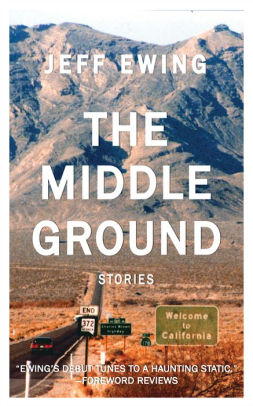
by Julia Tagliere
Reading a story collection is a bit like putting together a jigsaw puzzle or solving a mystery. With each story’s end, you see more of the work as a whole and come to understand The One Thing that ties the stories together; in the case of Jeff Ewing’s debut collection, The Middle Ground, it’s ghosts.
Some are conventional ghosts—dead mothers or fathers, dying children, or even “the fairytale creatures behind every stroke of good and bad luck” so cunningly woven into Ewing’s story, “Hiddenfolk.” But in his evocative collection, published in February 2019 by the micro literary journal Into the Void, Ewing, who is a ten-time Pushcart Prize nominee and winner of the California Newspaper Publishers Association Best Writing Award, does not stop at conventional.
This collection of 18 stories, some of which were previously published in Crazyhorse, Atticus Review, and SmokeLong Quarterly (“Parliament of Owls”), among others, haunts its reader with other ghosts: the ghosts of paths not taken, of former—or better—selves, the ghosts of fateful decisions.
In the exquisite “Coast Starlight” (which first appeared in Into the Void), for example, Ewing shares the story of a breathtakingly beautiful waitress dreaming of a bigger life in her small town. When her “big break” walks into the café, she doesn’t follow it, but she never completely forgets its face; she even makes an unsuccessful attempt to catch it later:
In the privacy and security of her own head, she finished the trip. She sat out on his patio with him and let the sun—softened by the ocean—drape itself over her…She always stopped there, before the story became ridiculous, before the probable reality intruded—Clifford’s apartment a drab warren on some nondescript street, the sky sooty and gray, sirens and drunken quarrels drowning out the distant waves. The ending wasn’t important anyway, it wasn’t even an ending necessarily…That’s how she put it to herself, anyway, on the days she let her mind off its leash.
In “The Shallow End,” Ewing captures with equal parts candor and tenderness the regrets and shortcomings of a father who knows just enough to know he will never understand his own failings, but can never escape their presence, especially when he befriends the neighbor girl, whose mother is dying:
“I’d always thought I’d be a good father, before Jeannie was born. Even for a while after. It was quite a shock to hear I wasn’t.”
Cindy was lying on the diving board, her head hanging over the end.
“What did you do, hit her or something?”
“No!”
“I don’t know. It must have been something bad.”
“She had a list of our failings. Reasons she wasn’t the person she thought she should be by then.”
…Cindy turned away from him, sniffling. Ludlow looked at her back, the little hunched shoulders that weren’t nearly up to what was being asked of them. Something was called for, he knew, another solution to another problem that was beyond him. He tapped the rake handle against his forehead. It never ended.
But conventional ghosts do carry their share of water in this collection, manifesting especially in the ways people, especially children, change after the loss of a parent, as in “Masterpiece,” which originally appeared in Juked. Ewing’s interiority of his character Nora—who grasps at last her heartbreaking culpability, having raised her younger brother after their mother’s death, for the callous, cruel, man he has become—is striking:
Nora had been trying for some time to put her finger on when he’d changed from a puppy into a nasty, snarling dog…Maybe it was her fault; she’d turned him into this. She should have let the mean world have him. Now she didn’t know how to defend herself, only him.
Ewing’s writing is thoughtful and nuanced; this passage from “Masterpiece” is an excellent example of that: “She washed the dirt from the carrots and started to peel them…She hated to throw the peelings away, even into the compost. Something beautiful should be done with them—the carrot underneath was utilitarian and nourishing; the beauty was in the peel.”
But don’t let “thoughtful and nuanced” give you the impression that reading Ewing’s stories is a passive endeavor: this collection provides a highly interactive, almost participatory experience: A phrase, line, or passage elicits an audible gasp, a pause to reflect, a heavy sigh, or even an uttered “Holy crap”:
The man at the aquarium…had also explained why the fish was no bigger after three years…
“They grow to the size of their containers.”
A practical adaptation that didn’t, unfortunately, apply to children. Jeannie had outgrown her container way ahead of time. (“The Shallow End”)
They’ve kept some things back, but the things they’ve kept are worthless…Old pictures, grainy, unrecognizable likenesses of what was supposed to be her—when she was a girl, a newlywed, a mother. Studio pictures with no life in them. The real pictures, the ones she and her daddy took and developed, are all in the albums in her room. But they’re not interested in those, all they see is empty fields and woods and sky in them—they can’t see the bird hidden in the clump of grass, or her daddy whistling beside her as she aims the camera. There’s so much they don’t understand that she doesn’t know where to start. (“Barn Sale”)
These are not stories that should be read quickly, nor is The Middle Ground a collection suited for gobbling up in one sitting; Ewing’s stories are too rich for that. Rather, they should be read as though one has all the time in the world to read a line and read it again, to linger over it, to let it haunt you. This is a collection worth making that kind of time to read.
Read “Parliament of Owls” by Jeff Ewing (SmokeLong Quarterly, December 2017).
Purchase The Middle Ground by Jeff Ewing.
______________________________________
 Julia Tagliere’s work has appeared or is forthcoming in The Writer, The Bookends Review, Potomac Review, Gargoyle Magazine, Washington Independent Review of Books, SmokeLong Quarterly, WritersResist, and multiple anthologies. Winner of the 2015 William Faulkner Literary Competition for Best Short Story and the 2017 Writers Center Undiscovered Voices Fellowship, Julia completed her M.A. in Writing at Johns Hopkins University. She serves as an editor with The Baltimore Review and is currently working on her next novel, The Day the Music Didn’t Die. Contact her at julia@justscribbling.com.
Julia Tagliere’s work has appeared or is forthcoming in The Writer, The Bookends Review, Potomac Review, Gargoyle Magazine, Washington Independent Review of Books, SmokeLong Quarterly, WritersResist, and multiple anthologies. Winner of the 2015 William Faulkner Literary Competition for Best Short Story and the 2017 Writers Center Undiscovered Voices Fellowship, Julia completed her M.A. in Writing at Johns Hopkins University. She serves as an editor with The Baltimore Review and is currently working on her next novel, The Day the Music Didn’t Die. Contact her at julia@justscribbling.com.

 The core workshop of SmokeLong Fitness is all in writing, so you can take part from anywhere at anytime. We are excited about creating a supportive, consistent and structured environment for flash writers to work on their craft in a community. We are thrilled and proud to say that our workshop participants have won, placed, or been listed in every major flash competition. Community works.
The core workshop of SmokeLong Fitness is all in writing, so you can take part from anywhere at anytime. We are excited about creating a supportive, consistent and structured environment for flash writers to work on their craft in a community. We are thrilled and proud to say that our workshop participants have won, placed, or been listed in every major flash competition. Community works.